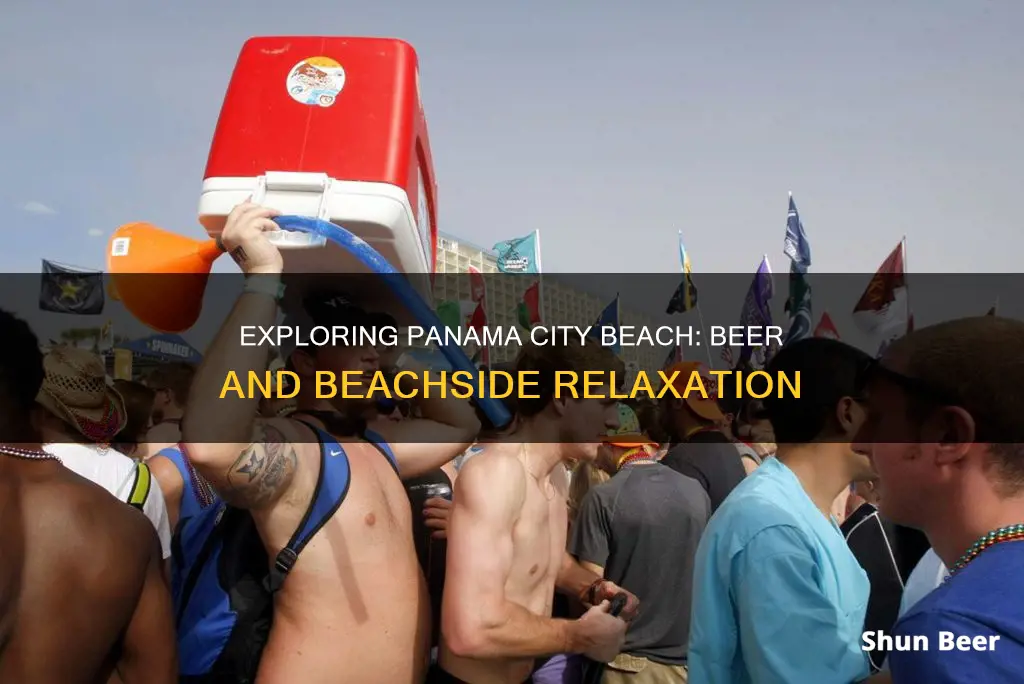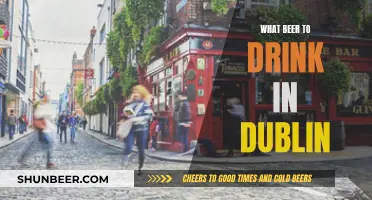
If you're planning a trip to Panama City Beach and are hoping to enjoy a cold beer on the sand, you may need to be mindful of local drinking laws. While Panama City Beach allows drinking on the beach for most of the year, there are a few key exceptions to be aware of. Firstly, alcoholic beverages are prohibited on the sandy beach during the month of March, a restriction aimed at controlling rowdy spring break crowds. Additionally, glass bottles are banned on the beach year-round, so be sure to stick to cans or plastic cups for your drinks. Lastly, alcohol is not permitted outdoors in state parks like St. Andrews, so plan your drinking spots accordingly. As long as you keep these rules in mind, you can responsibly enjoy a beverage while soaking up the sun on Panama City Beach.
| Characteristics | Values |
|---|---|
| Alcohol consumption on the beach | Allowed for persons 21 or older, except during March |
| Containers | Glass bottles are prohibited |
| Alcohol consumption in state parks | Not allowed |
| Alcohol consumption in commercial parking lots | Not allowed during March |
| Alcohol sale curfew | No sales after 2 a.m. during March |
What You'll Learn

Drinking laws in Panama City Beach
The alcohol ban in March also extends to commercial parking lots and the sale of alcohol after 2 a.m. Those who break the rule can face a fine of up to $500 or jail time.
In addition to the drinking laws, Panama City Beach also enforces a beach flag warning system to alert swimmers when water conditions are dangerous. Red flags indicate a high hazard, and swimmers are urged to use extreme caution. Double red flags mean that the Gulf of Mexico is closed to the public.
It is also important to note that drinking laws can change, so it is recommended to check for the most up-to-date information before planning a trip to Panama City Beach.
Beer Hour: Understanding the Social Drinking Culture
You may want to see also

Alcohol is banned on the beach in March
Alcohol is banned on the beach in Panama City in March. This rule is in place to control crowds of rowdy spring breakers who used to flock to the beach. The ban applies to the sandy beach, commercial parking lots, and the sale of alcohol after 2 a.m. The consumption of alcoholic beverages on the beach is permitted for those 21 or older in the other 11 months of the year, but glass bottles are prohibited year-round.
The ban was put in place in 2016, and those who break the rule can face a fine of up to $500 or be sentenced to jail. In March 2021, Panama City Beach police made over 360 arrests, including 16 juveniles.
The law is common knowledge for residents and regular visitors to Panama City Beach, but many out-of-town visitors are unaware of it. It is important to follow the local laws and regulations when consuming alcohol in public places, and to be mindful of the impact that excessive drinking can have on the community.
In addition to the alcohol ban, there are other rules and regulations in place during March in Panama City Beach. These include ordinances prohibiting the possession or consumption of alcohol in certain areas, such as commercial parking lots, and restricting the sale of alcohol after 2 a.m. These rules are intended to ensure the safety of residents and visitors and give law enforcement additional tools to manage spring break crowds.
Panama City Beach has a flag warning system that alerts swimmers when water conditions are dangerous. It is illegal to enter the Gulf of Mexico when double red flags are raised. Beachgoers should always follow the flag system to ensure their safety and the safety of others.
Beer Drinking on Atlantic Beach, NC: What's Allowed?
You may want to see also

No glass bottles are allowed on the beach
If you're planning a trip to Panama City Beach and want to enjoy a drink or two on the beach, there are a few things you should know about the local drinking laws. Firstly, persons aged 21 or older are allowed to consume alcoholic beverages on the beach for 11 months of the year. However, one of those months, March, is when alcohol is prohibited on the sandy beach. So, if you're visiting during that time, you'll need to keep your drinks confined to a bar or your accommodation.
Now, let's talk about the type of container you can drink from. Glass bottles are strictly prohibited on the beach all year round. This means that if you want to sip on an alcoholic beverage while soaking up the sun, you'll need to opt for cans or plastic cups instead. This rule is in place to prevent injuries caused by broken glass, as well as to protect the natural environment of the beach. So, if you're packing a cooler for a day at the beach, make sure to leave the glass bottles behind and opt for alternative containers.
It's important to respect the local laws and regulations to ensure that everyone can enjoy the beach safely. While it may be tempting to sneak a glass bottle onto the beach, it's simply not worth the risk. The local police are vigilant in enforcing these rules, and you could face a hefty fine or even arrest if you're caught breaking the law. So, remember to enjoy your drinks responsibly and follow the guidelines set out by the local authorities.
Additionally, it's worth noting that St. Andrews State Park, located on the East End of Thomas Drive, has an alcohol ban in place all year round. This rule applies to all outdoor areas within the park, so if you're planning a visit, make sure to leave your alcoholic beverages behind. The alcohol ban in this particular park is likely due to its popularity among visitors, as it offers a variety of attractions, including shelling sites and opportunities for swimming, snorkeling, and more.
Apple Cider Vinegar and Beer: A Healthy Mix?
You may want to see also

Drinking in St. Andrews State Park
St. Andrews State Park is one of the 96 public access points to the beaches in Bay County, Panama City. While drinking laws in Panama City are generally relaxed, there are a few rules that you need to be aware of if you're planning on drinking in St. Andrews State Park.
Firstly, St. Andrews State Park is an outdoor state park, and as such, alcohol is banned there year-round. This means that if you're planning on drinking in St. Andrews State Park, you'll need to find another spot to enjoy your beverage.
In addition to the ban on drinking in outdoor state parks, it's also worth noting that glass bottles are strictly prohibited on all beaches in Bay County, so be sure to bring your drinks in plastic or aluminum containers.
Another important thing to keep in mind is that drinking alcohol on the sandy beaches of Panama City is prohibited during the month of March. This rule was put in place to control crowds of rowdy spring breakers and has been in effect since 2016. So, if you're visiting St. Andrews State Park during March, make sure to abide by this rule and avoid drinking on the sandy beach.
Lastly, while drinking is allowed on the beach for those 21 and older for 11 months of the year, it's important to follow the city's beach flag warning system. For example, it is illegal to enter the Gulf of Mexico when double-red flags are raised, indicating very dangerous conditions.
Skydiving Soon? Pre-Flight Beer: Yay or Nay?
You may want to see also

Drinking laws in the wider country of Panama
In Panama City Beach, Florida, alcohol consumption is permitted on the beach for those aged 21 and over, except during the month of March. This prohibition has been in place since 2016, and violations can result in a fine of up to $500 or even jail time. Glass bottles are also prohibited on the beach year-round.
In terms of the wider country of Panama, public drinking laws vary. While some sources indicate that drinking in public is illegal, with fines ranging from $15 to $30, others suggest that the law is not always strictly enforced outside of certain areas, such as Casco Viejo and Old Town. It is generally advised to be cautious and avoid drinking in public to prevent any potential legal issues.
Panama's drinking laws also extend to the purchase and consumption of alcohol within the country. While the legal drinking age in Panama is 18, it is important to note that some establishments may have their own age restrictions, with many hotels requiring guests to be 21 or older, and condominiums often imposing higher age requirements of 25 or 27. Additionally, alcohol prices in Panama can vary significantly, with some reporting that it is less expensive to purchase alcohol from a liquor store and consume it at home rather than drinking at pubs or restaurants.
Drinking Beer Post-Durian: Safe or Risky?
You may want to see also
Frequently asked questions
Yes, persons 21 or older are allowed to consume alcoholic beverages on the beach 11 months out of the year. Alcoholic beverages are not permitted on the sandy beach during the month of March.
No, there is no alcohol allowed outdoors in any state park (St. Andrews).
Glass bottles are strictly prohibited year-round on the beach. Drink from plastic or aluminium containers instead.
If you break the rule, you could be jailed and fined up to $500.







